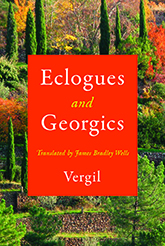|
Eclogues and Georgics
Vergil
Translated by James Bradley Wells
Wisconsin Studies in Classics
“That Wells comes at Vergil from two angles of approach—that of classics scholar and that of a poet in his own right—makes him perhaps uniquely qualified to deliver us these exciting new translations of Eclogues and Georgics. The triumph here is that Wells brilliantly grafts elements of English prosody onto Vergil's original, enriching the work without obscuring its original cultural context. Indeed, Wells's innovative application of Hopkins-esque sprung-rhythm and compounds—hawkshriek, ironrust, doombent—enlivens the text, helping Vergil's work take on new resonance and urgency in English. As a piece of translation and a piece of poetry, Wells's innovation is refreshing and his achievement is tremendous.”
—Iain Haley Pollock, winner of the Cave Canem Poetry Prize and author of Ghost, like a Place
James Bradley Wells combines creative practice and intimate knowledge of contemporary poetry and classical antiquity in this thought-provoking new translation of two early works by ancient Rome’s most well-known and most esteemed poet, Vergil’s Eclogues and Georgics. With its emphasis on the musicality of English, Wells’s translations honor the original spirit of Latin poetry as both a written and performance-based art form.
The accompanying introductory essays situate Vergil’s poems in a rich literary tradition. Wells provides historical context and literary analysis of these two works, eschewing facile interpretations of these oft examined texts and ensconcing them in the society and culture from which they originated. These annotated essays, a pronunciation guide, and a glossary, alongside Wells’s bold vision for what translation choices can reveal, guide readers as they explore this ancient and famously difficult poetry.
James Bradley Wells is an associate professor of classical studies at DePauw University. He has worked widely as a poet, translator, and critic. He is author of Pindar’s Verbal Art and his own original poetry has been collected and published in Bicycle and The Kazantzakis Guide to Greece.
Praise
“Of all the great poems of the Latin tradition, Vergil’s Eclogues and Georgics are notoriously the most elusive of fine translation. The poetic strength of Wells’s fine new versions derives from a precise yet flexible English line and a rendering of Vergil’s language that is as clear eyed and unsentimental as any we are likely to encounter.”
—William Levitan, Grand Valley State University
“Erudite, informative, insightful, thought-provoking, and superbly translated. . . . A significant and unreservedly recommended addition.”
—Midwest Book Review
“Demonstrates an intense engagement with Virgil's poetic language as well as a sensitivity to its expressiveness and singularity.”
—Revue des Études Anciennes
“Wells’s translations are engaging and his introductions make the poems and his theory of translation accessible to a wide audience.”
—CHOICE Reviews
“[Wells’] translation of Vergil’s Eclogues and Georgics, by virtue of its unencumbered diction, flexible syntax, and captivating rhythm, reads as a self-sufficient text that speaks directly to the modern anglophone audience. Wells recreates Vergil with sustained vividness and poetic vigor.”
—Vergilius
Table of Contents
Preface
Chronology
Statement on Translation
Pronunciation Guide
General Introduction to Vergil and His Poetry
Vergil’s Eclogues
Introduction to Vergil’s Eclogues
Eclogue 1
Eclogue 2
Eclogue 3
Eclogue 4
Eclogue 5
Eclogue 6
Eclogue 7
Eclogue 8
Eclogue 9
Eclogue 10
Vergil’s Georgics
Introduction to Vergil’s Georgics
Book 1
Book 2
Book 3
Book 4
Glossary
Notes
Bibliography
Of Related Interest
|

Lysistrata
A New Verse Translation
Aristophanes
Translated by David Mulroy, with introduction and notes |

The Oresteia
Agamemnon, Libation Bearers, and The Holy Goddesses
Aeschylus
A verse translation by David Mulroy, with introduction and notes |
|

Larger images
July 2022
LC: 2021041604 PA
238 pp. 6 x 9
|

